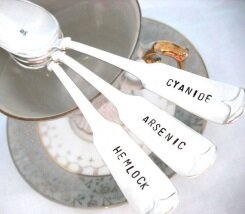Putting down the spoons
The words we choose to say to ourselves when we are alone, when we’re at a low ebb, say a lot about how we see ourselves. Many people use positive affirmations, but before they discovered those, they may have had their opposites – negative denials. Words reflecting a belief that they were permanent failures, worthless, never enough etc. Coming to recognise that those beliefs aren’t true is a hard journey, and when you face challenges, such as a personal loss or global pandemic, you may fall back a few steps and start believing them again. And those beliefs, so old and familiar, bring a strange comfort for a while, until the newer parts of you wake up and realise they’re not true and you can’t stay with them. It’s a cycle I know well, from myself and my clients. Part of the knack of surviving and pulling out of that cycle for me is to put down the spoons.
There is an array of voices and thoughts in our minds, I now call my negative ones my ‘spoons’. I used to believe that the things I said to myself, such as ‘why don’t you make a list of all the things going wrong?’ or ‘you really should be able to manage all of this more easily’ were helpful and motivating. When it’s normal to believe you can’t cope, then it seems natural to remind yourself of that by repeating ‘you need to try harder’. But if the opposite is true – that you are coping, but are in a difficult situation that can’t be solved instantly, then just berating yourself is useless and potentially harmful. I am human, and it’s ok to have not fixed the universe before breakfast. That’s not because I can’t cope, but because that wasn’t a useful expectation to place on today, or any day.
I once thought that the spoons held a bitter medicine I had to swallow. I now know that they have all the hallmarks of being helpful and truthful, but are neither. But when my defences are low, the tendency to pick up the spoon returns, and as it is such a well-known flavour, I may find I am a few doses in before I remember I don’t need to spoon such thoughts in. I question myself when I claim I’m not doing enough, not keeping on top of the world. Had I never been through therapy, I probably wouldn’t have paid much attention to whether those thoughts were indeed helpful, or question what such thinking says about my view of me. Being able to say those thoughts aloud, and have them gently challenged as perhaps not quite in keeping with reality, was a landmark in my own therapeutic journey.
Awareness of what is in my spoons is crucial, but this isn’t a one off discovery. Learning to manage my wellbeing so that I have the resilience not to fall back to old habits is not just important, it is essential. That’s why self-care isn’t mindless pampering or a lazy luxury, it is maintenance and work in itself. We don’t need to be in the grip of a pandemic for that to apply to all of us, but perhaps some of the extra time we are spending alone or apart could be put to exploring what your spoons might have in them. What are you so used to saying to yourself that you don’t even question whether it’s still (or has ever been) true? How might it feel to stop for a while, come off the medicine, and see if there is a change? This is challenging work, but you deserve to know and admire the truth about yourself, to put down the spoons, and believe something daringly new instead.
